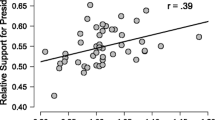Abstract
What do tautological phrases such asBoys will be boys, A promise is a promise, or War is war mean and how are they understood? These phrases literally appear to be uninformative, yet speakers frequently use such expressions in conversation and listeners have little difficulty comprehending them. Understanding nominal tautologies requires that listeners/readers infer the speaker's attitude toward the noun phrase (e.g.,boys) mentioned in the sentence. The purpose of the present studies was to investigate the role of context, syntactic form, and lexical content in the interpretation of nominal tuatologies. Two studies are reported in which subjects rated the acceptability of different tautological constructions either alone (Experiment 1) or with supporting contextual information (Experiment 2). The results of these studies provide evidence that colloquial tautologies can be interpreted differently in different contexts, but that there are important regularities in the syntactic form and lexical content of these phrases which influence how they are understood. Our findings highlight the importance of speakers/listeners' stereotypical understanding of people, activities, and concrete objects in the use and understanding of different tautological expressions. The implications of this research for psycholinguistic theories of conversational inference and indirect language use are discussed.
Similar content being viewed by others
References
Boatner, M., Gates, J., & Makkai, A. (1975).A dictionary of American idioms. New York: Baron's Educational Series.
Brown, P., & Levinson, S. (1978): Universals in language usage: Politeness phenomena. In E. Goody (Ed.),Questions and politeness (pp. 56–311). Cambridge: Cambridge University Press.
Carroll, J., Davies, P., & Richman, B. (1971).Word frequency book. New York: Houghton Mifflin.
Clark, H. (1985). Language use and language users. In G. Lindsay & E. Aronson (Eds.),Handbook of social psychology (third edition) (pp. 179–231). New York: Wiley.
Clark, H., & Carlson, T. (1982). Context for comprehension. In J. Long & A. Baddeley (Eds.),Attention and performance. XI (pp. 313–330) Hillsdale, NJ: Erlbaum.
Dahlgren, K. (1985). The cognitive structure of social categories.Cognitive Science, 9, 379–398.
Fraser, B. (1988). Motor oil is motor oil: An account of English nominal tautologies.Journal of Pragmatics, 12, 215–220.
Gibbs, R. (1984). Literal meaning and psychological theory.Cognitive Science, 9, 275–304.
Gibbs, R. (1986). On the psycholinguistics of sarcasm.Journal of Experimental Psychology: General, 104, 3–15.
Gibbs, R. (1987). Mutual knowledge and the psychology of conversational inference.Journal of Pragmatics, 11, 561–588.
Gibbs, R., Mueller, R., & Cox, R. (1988). Common ground in asking and understanding questions.Language and Speech, 31, 321–335.
Grice, H. P. (1975). Logic and conversation. In P. Cole and J. Morgan (eds.),Syntax and semantics 3: Speech acts (pp. 41–58). New York: Academic Press.
Grice, H. P. (1978). Some further notes on logic and conversation. In P. Cole (Ed.),Syntax and semantics 9: Pragmatics (pp. 113–128). New York: Academic Press.
Levinson, S. (1983).Pragmatics. Cambridge: Cambridge University Press.
Long, T., & Summers, D. (1979).Longman dictionary of English idioms. London: Longman.
Putnam, H. (1975). The meaning of meaning. In H. Putnam (Ed.),Mind, language, and reality: Philosophical papers, Vol. 2. (pp. 215–271). Cambridge: Cambridge University Press.
Rosch, E., & Mervis, C. (1975). Family resemblances.Cognitive Psychology, 7, 573–605.
Wierzbicka, A. (1987). Boys will be boys: ‘Radical semantics’ vs. ‘radical pragmatics’,Language, 63, 95–114.
Wierzbicka, A. (1988). Boys will be boys: A rejoinder to Bruce Fraser.Journal of Pragmatics, 12, 221–224.
Author information
Authors and Affiliations
Rights and permissions
About this article
Cite this article
Gibbs, R.W., McCarrell, N.S. Why Boys will be boys and girls will be girls: Understanding colloquial tautologies. J Psycholinguist Res 19, 125–145 (1990). https://doi.org/10.1007/BF01068094
Received:
Issue Date:
DOI: https://doi.org/10.1007/BF01068094



